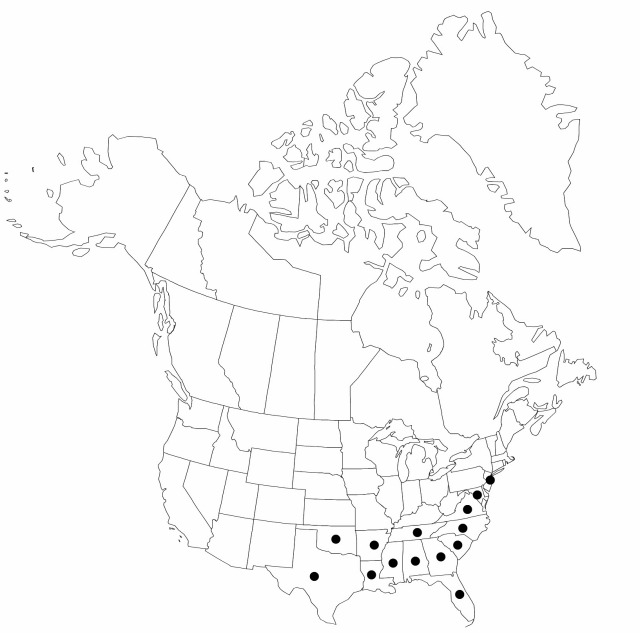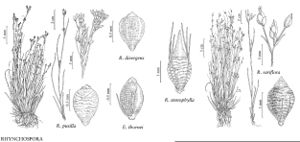Difference between revisions of "Rhynchospora rariflora"
Sketch Bot. S. Carolina 1: 58. 1816.
imported>Volume Importer |
imported>Volume Importer |
||
| Line 60: | Line 60: | ||
|publication year=1816 | |publication year=1816 | ||
|special status=Illustrated | |special status=Illustrated | ||
| − | |source xml=https:// | + | |source xml=https://bitbucket.org/aafc-mbb/fna-data-curation/src/2e0870ddd59836b60bcf96646a41e87ea5a5943a/coarse_grained_fna_xml/V23/V23_386.xml |
|genus=Rhynchospora | |genus=Rhynchospora | ||
|species=Rhynchospora rariflora | |species=Rhynchospora rariflora | ||
Latest revision as of 20:40, 5 November 2020
Plants perennial, densely cespitose, 15–60 cm; rhizomes compact, branching, slender. Culms lax,filiform, leafy, terete, grooved. leaves ascending to erect, exceeded by culm, blades lax, filiform, margins proximally deeply involute, apex trigonous, tapering. Inflorescences mostly cymose clusters, simple or compound, 1–3(–4), widely spaced, loose, narrowly to broadly turbinate;, branchies capillary, ascending to spreading, leafy bracts setaceous, exceeded by or exceeding cymes. Spikelets light redbrown or brown, lanceovoid to fusiform, 3–4(–4.5) mm, apex acuminate, fertile scales ovate, mostly 2–3 mm, apex rounded to acute, midrib included or shortexcurrent. Flowers: perianth bristles mostly 6, unequal, rarely extending past fruit midbody, antrorsely barbellate. Fruits 1–4 per spikelet, 1.8–2 mm, body yellowbrown to brown, lustrous, tumidly obovoidlenticular, 1–1.5 × 1–1.5 mm, surfaces transversely wavyrugose, intervals vertically striate with narrow alveolae, tubercle flat, triangular, 0.3–0.6 mm.
Phenology: Fruiting spring–summer or all year (south).
Habitat: Sands or peats of low savannas, seeps, bogs, flatwoods, pond shores, stream banks
Elevation: 0–400 m
Distribution

Ala., Ark., Fla., Ga., La., Md., Miss., N.J., N.C., Okla., S.C., Tenn., Tex., Va., Mexico, West Indies, Central America.
Discussion
Rhynchospora rariflora forms solid tussocks by means of short, forking, compact masses of rhizomes.
Selected References
None.
